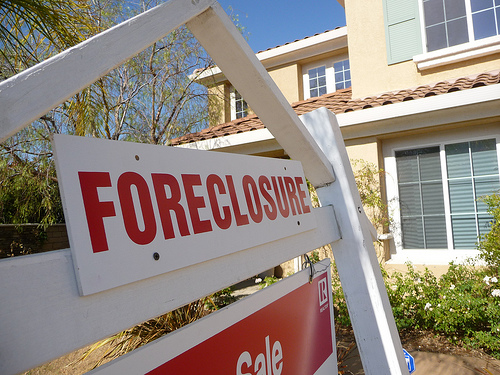Looking Out for the Homeowner
Jul 31, 202040.6K Shares1M Views
Flickr: respres
Imagine applying for a mortgage in a few years and finding out it works like this: You are offered a standard 30-year fixed-rate loan. The only route to a different mortgage — a riskier one, say, with an adjustable interest rate — is to opt out.
You’d have to say “no,” the way some employees decline if they decide not to contribute to an employer-sponsored retirement savings account. Otherwise, you’re automatically enrolled.
The opt-out mortgage is one of many ideas now floatingaround to regulate the financial-services industry. With the financial landscape radically changed by government intervention and partial nationalizationof the nation’s largest banks, it’s clear that the deregulation phase of financial services is over.
Illustration by: Matt Mahurin
The question consumer advocates and financial experts are left to grapple with is what kind of new regulation should take place — and how they can ensure that it will work.
It’s not simple.
Congress has to tackle the huge shadow banking systemof credit default swapsand other derivatives, which means regulating the unknown because little information exists about these products and their markets. It has to figure out how to put teeth into disclosure, which reigned through the past decade as the tool the financial markets used — supposedly — to avoid deceptive tactics.
But the housing bust discredited the efficacy of disclosure alone. Telling a borrower his interest rate would increase in a few years didn’t accomplish much when the broker was also reassuring him that he could refinance his mortgage because housing values always go up. Basically, the industry can’t be trusted to police itself, advocates say.
“There’s no denying the fact that the financial services industry’s shunning of regulation has been a disaster,” said Eric Stein,senior vice president of the Center for Responsible Lending, which follows the lending industry. “The events of the last year show that a new approach is necessary.”
There’s no better time than the present to create sensible rules, given the government’s nationalization of Fannie Mae and Freddie Mac and its equity stakes in nine major banks, said Michael Barr,a University of Michigan law professor who studies financial services.
“The Treasury and the Federal Reserve have played the role of lender of last resort for a wide range of financial institutions that had not been under their supervision before,” Barr said. “You can’t put that genie back in the bottle.”
One proposal, pushed by Elizabeth Warren,a Harvard University bankruptcy expert, calls for a Financial Products Safety Commission to protect consumers. The commission would be modeled after the Consumer Products Safety Commission, as Warren explained at Creditslips.org,and would “level the playing field between big financial institutions and customers.”
Warren used an exploding toaster to argue her case:
“„it is impossible to buy a toaster that has a one-in-five chance of bursting into flames and burning down your house. But it is possible to refinance your home with a mortgage that has the same one-in-five chance of putting your family out on the street — and the mortgage won’t even carry a disclosure of that fact. Similarly, it’s impossible for the seller to change the price on a toaster once you have purchased it. But long after the credit-card slip has been signed, your credit-card company can triple the price of the credit you used to finance your purchase, even if you meet all the credit terms. Why are consumers safe when they purchase tangible products with cash, but left at the mercy of their creditors when they sign up for routine financial products like mortgages and credit cards?
The commission would establish disclosure guidelines for consumers, as well as and collect and report data on financial-services products that commonly result in consumer defaults. It would review mortgages, credit card and car loans before they are marketed to the public — looking for hidden tricks and making sure that consumers face no dangerous risks.
In short, it would do almost the same thing that the Consumer Product Safety Commission does — only for financial products. The idea has gained supportfrom Nobel prize-winning economist Joseph Stiglitzand from Sen. Dick Durbin (D-Ill.), who has fought for more funding for the Consumer Products Safety Commission.
But the proposed commission raises concerns.
Ellen Seidmanof the New America Foundation, who studies the financial-services industry, said the Consumer Products Safety Commission, the Federal Trade Commission and other consumer-protection efforts “have had a long history of being terribly underfunded,” making them less effective. There’s no guarantee a financial-products safety commission, strapped for funds, would escape the same fate — especially when its goal is to intervene before “the bad stuff” gets to consumers, she said.
Beyond the proposed commission, there are other ideas to protect consumers.
Behavioral economists are studying ways to ensure that consumers make decisions that benefit their bottom lines — and they believe that increasing government regulatory powers would accomplish that goal, said Barr.
“It’s very easy to convince people to do things that aren’t in their financial interest,” Barr said, citing the fact that lenders marketed loans that seemed less risky and expensive than they really were — and borrowers signed up for them.
One way to help consumers is to convince them to make better choices. Barr cited researchthat found workers save more for retirement when they are automatically enrolled in their 401 (k) plans.
In regard to mortgage loans, borrowers should be presentedwith the standard-mortgage option first — like the 30-year fixed-rate loan — and then be required to opt out of that loan to take on a riskier mortgage, he said.
“The idea is the same as with 401 (k) plans,” he said.
Barr calls his idea a “sticky” mortgage opt-out system because lenders would be required to offer additional disclosures if a borrower opted for a riskier loan that would expose him to greater liability or sanctions, should he default.
One problem with the subprime mortgage market, in particular, was that too many options confused consumers, though lenders touted the choices as a benefit.
“In reality, people are easily overwhelmed by too many options and make mistakes, often in predictable ways,” Barr wrote in a paper outlining his proposal. “People will pick options that carry a greater likelihood of failing than anticipated. An opt-out mortgage system would mean borrowers would be more likely to receive straightforward loans they could understand.”
Longtime opponents of government regulation, however, believe that restrictive regulations can go too far in keeping consumers from making their own choices. They insist there’s still hope for disclosure, if handled correctly.
At the pro-business American Enterprise Institute, resident fellow Alex Pollock, a financial-policy expert, has createdwhat he calls the Pollock one-page mortgage-application form. He describes it as all the disclosure a consumer needs — and can understand — in one simple form, the opposite of the average 80-to-85 page real-estate closing package.
The idea, Pollock said, is to continue allowing consumers to make the choice on what kind of loan they want — as long as they understand it. In essence, they underwrite themselves.
The top of Pollack’s proposed form says, “The Basic Facts About Your Mortgage Loan,” and it ends with, “Do Not Sign This if You Don’t Understand It.”
“It’s designed for consumers,” said Pollock, “as opposed to something designed by lawyers.”
Pollock’s idea might pick up support, but more governmental regulation seems inevitable.
There won’t be anymore “voluntary reporting requirements and an occasional visit from seven examiners at the [Securities Exchange Commission],” Barr said.
In light of Wall Street’s collapse, the argument, often made by the lending industry, that government regulators wouldn’t be sophisticated enough to put together rules for complex financial instruments and markets has fallen by the wayside, he said.
On Tuesday, Sen. Tom Harkin (D-Ia.) declaredthat credit default swaps and other derivatives should be traded on regulated exchanges. He said that he plans to introduce a bill to make that happen.
Stein, of the Center for Responsible Lending, said his group will continue to press for a change in federal law to allow bankruptcy judges to modify mortgages. Consumer advocates soughtthat measure in the $700-billion rescue plan, but weren’t successful.
As regulations are created, it also makes sense to merge two agencies that oversee banks — the Office of Thrift Supervision and the Office of the Comptroller of the Currency — Stein said. The duties of the two regulators tend to overlap, so some lenders figured out that the rules could be less stringent at one agency than the other. Often, these lenders would choose to be regulated by the more lenient one. That’s what happened with Countrywide, Stein said.
But all the enthusiasm for rule-making can go too far, creating a huge political overreaction, said Desmond Lachman,Pollock’s colleague and an economist at the American Enterprise Institute. Lachman pushedfor government intervention to bail out the financial system — but he’s not in favor of similar activism when it comes to beefing up consumer regulations.
“Clearly, there’s a huge backlash,” he said. “People are mad. People lost their life savings while Wall Street traders made all this money.”
Look at the Republican presidential ticket, he said. Sen. John McCain, the GOP presidential nominee, is usingterms like greed and corruption to describe Wall Street. That makes it harder for traditional defenders of deregulation to speak up.
Lachman and other anti-regulation forces always point to Sarbanes-Oxleyrules, developed after the Enron scandal, as an example of how too much regulation can cause problems for businesses.
But with millions of foreclosures, the collapse of the housing market and the credit crunch, people pushing for tougher regulation these days have examples of their own.

Paula M. Graham
Reviewer
Latest Articles
Popular Articles

